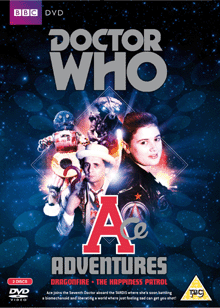 It’s hard to think of a Doctor Who story that more conspicuously exposes the limitations of an all-studio production than 1987’s Dragonfire – and that’s even after you consider the stiff competition.
It’s hard to think of a Doctor Who story that more conspicuously exposes the limitations of an all-studio production than 1987’s Dragonfire – and that’s even after you consider the stiff competition.
Managing the difficult juggling act of being both pretentious and slapstick, the many references to art house film theory suggest that writer Ian Briggs is working through his Pauline Kael phase. But he’s willing to throw in also a Pygmalion-style statue, an ice vampire-cum-supermarket manager, and the kind of wacky antics you’d normally find in a low-budget CITV sitcom.
The result is a strange push-me-pull-you of a script which tries to take a ‘something for the adults, something for the children’ approach but ends up satisfying neither.
As a story treatment, it must have worked just fine: an ice planet that hides its secrets behind mythologies and treasure maps. But, in realisation, it’s not just the tinselly sets and glaring studio lighting that let it down.
The main problem is that few people in this imagined world behave like anyone you’ve ever met. Ian Briggs can write and write well, as The Curse of Fenric would prove two years later. But here, for every great one liner there are two or three clunkers that send you scurrying behind the sofa – for all the wrong reasons.
Very occasionally, the dialogue is so deft you want to applaud. ‘If he was a mortician,’ says space-geezer Glitz, ‘the corpses would keep their eyes open.’ Then you remember that this is the same character who is prone to exclaiming, ‘It’s all a load of old spacedust!’
A greater offender still is new companion, Ace.
Let’s be clear on the matter: Sophie Aldred as Ace is one of the great revitalising joys of ‘classic’ Doctor Who’s last two seasons – a companion who, if not exactly ‘real’, was allowed to do ‘real’ things, like fancy people and tease the Doctor and form a semi-lesbian sisterly bond with a bipedal cat woman with a fondness for hunting. As you do.
Unfortunately, here she spends her time trundling around in a space café, throwing milkshakes over people’s heads, and delivering the kind of dialogue that has never been spoken by Britain’s teenagers.
The script – ever so slightly in love with Ace’s radical new energy – wants to paint her as a young woman in whose hands any can of deodorant is a potentially explosive weapon. But it’s clear that Ace’s real capacity for violence lies in what she does to the English language. ‘I ain’t got no mum and dad! I’ve never had no mum and dad and I don’t want no mum and dad!’
In Ace’s world, any noun is a potential insult or term of affection: ‘bird-bath’, ‘doughnut’, ‘bunch of spots’. It’s only convincing if you’re willing to entertain the notion that a highly articulate young woman has so fragile a sense of self that any idiom or patois rubs off on her like so much old spacedust. ‘I know what unimpeachable means, bird-bath, but what makes you so certain this map’s pedigree is 24 carat?’
Frankly, if Sophie Aldred hadn’t impressed show bosses so much in her big temptation scene with Kane, or bonded with Sylvester McCoy over radical touring theatre, it’s more than conceivable that the character would never have returned, so awkward are the attempts to inject urban realism into the companion role.
It would have been our loss – really our loss. Ace a year later would genuinely live up to her nickname when everyone stopped trying quite so hard. But here, amid so many bird-baths and bilge-bags, she’s one cardboard element too far.
![]()
Extras: In both the story commentary and making-of feature, Fire and Ice, Briggs and script editor, Andrew Cartmel, are keen to pat themselves on the back for their attempts to take Doctor Who storytelling into new territory.
So it’s up to director Chris Clough to cringe on behalf of the audience at the deficiencies in production. Inevitably, the notorious cliffhanger to Episode 1 comes in for particular criticism here, as the Oncoming Storm dangles over a cliff edge and gurns. But in truth, the Doctor here is a fall guy in more ways than one, and it feels wrong that one scene should attract so much interest when it’s just one ill-conceived and illogical moment among so many.
Rather more aware of the story’s weaknesses are fan critics, Josie Long, Simon Guerrier and Joe Lidster who, in the latest in an ongoing series of DVD features, join up to laugh their way through the more bonkers story elements. At times, there’s a feel of a student pub night to the discussion; but their criticisms are astute. When Lidster observes that a trick was missed in not giving Kane more of the supermarket puns he unleashes in his final scene, you realise that he’s not wrong.
Jokes about existentialism may impress the adults, and pantomime with milkshakes may tickle the kids; but the best Who stories operate with the kind of big-hearted inclusivity that satisfies both audiences at once.
![]()
Released on DVD on Monday 7th May 2012 by BBC Worldwide.
> Buy the Ace Adventures boxset on Amazon.
What are your memories of Dragonfire? Let us know below…

